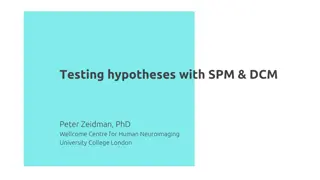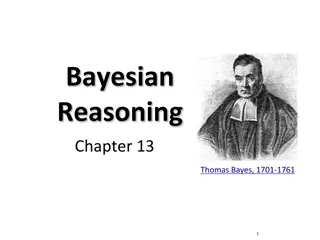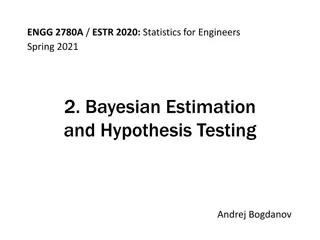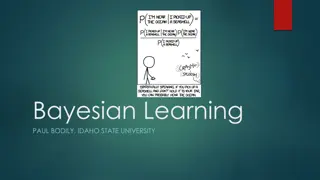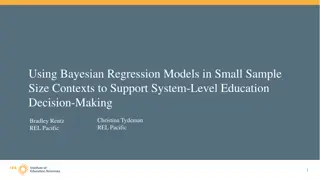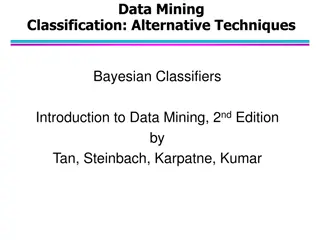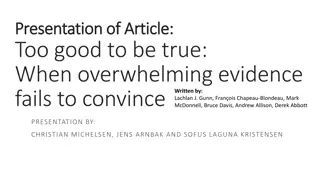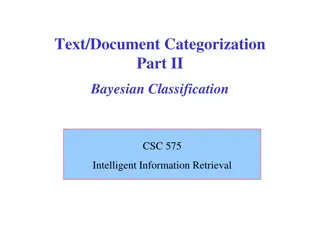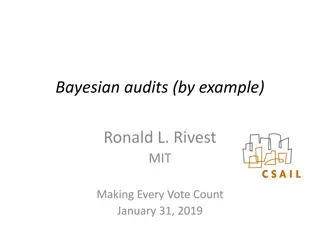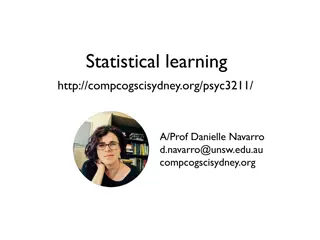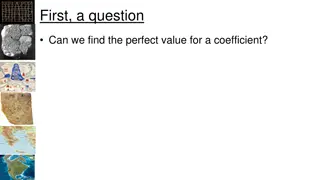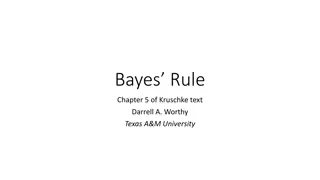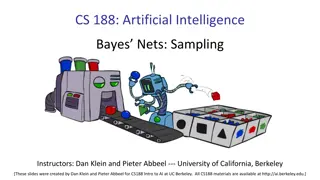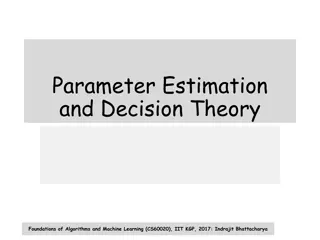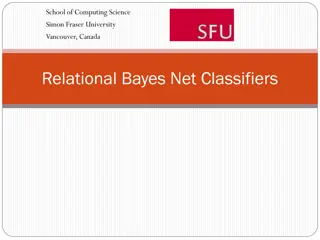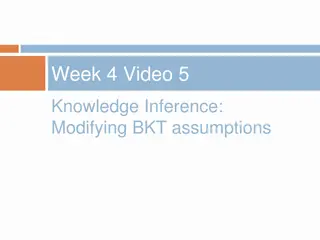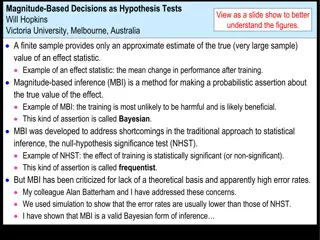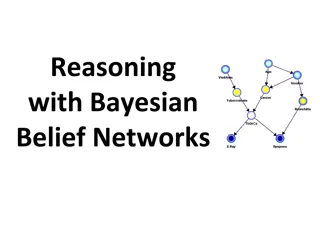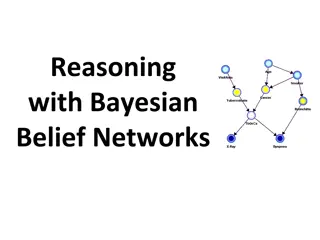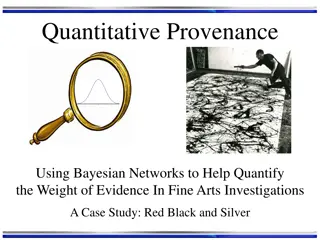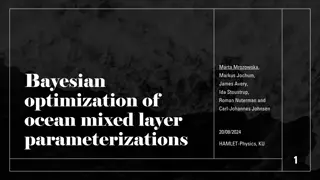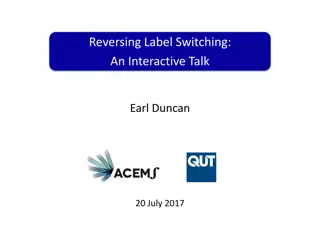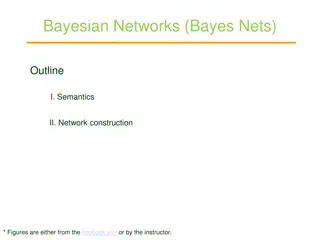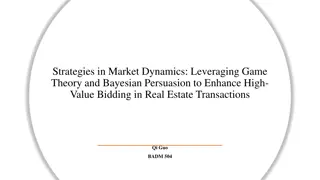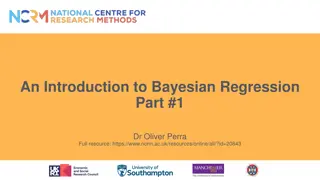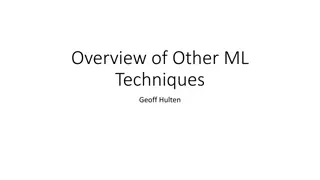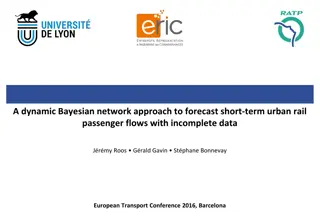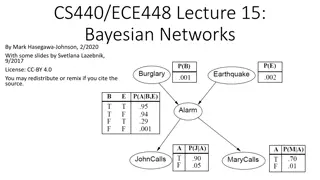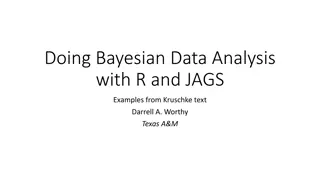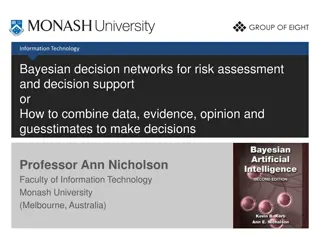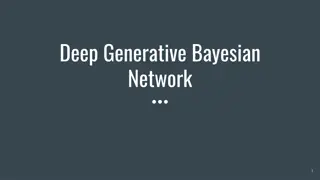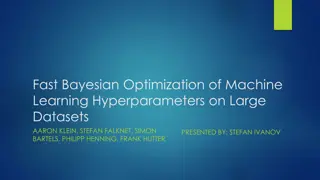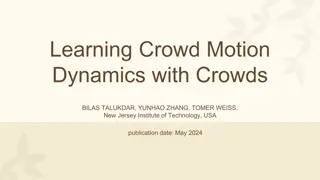Understanding Bayesian Model Comparison in Neuroimaging Research
Exploring the process of testing hypotheses using Statistical Parametric Mapping (SPM) and Dynamic Causal Modeling (DCM) in neuroimaging research. The journey from hypothesis formulation to Bayesian model comparison, emphasizing the importance of structured steps and empirical science for successful
4 views • 36 slides
Understanding Bayesian Reasoning and Decision Making with Uncertainty
Exploring Bayesian reasoning principles such as Bayesian inference and Naïve Bayes algorithm in the context of uncertainty. The content covers the sources of uncertainty, decision-making strategies, and practical examples like predicting alarm events based on probabilities.
2 views • 32 slides
Bayesian Estimation and Hypothesis Testing in Statistics for Engineers
In this course on Bayesian Estimation and Hypothesis Testing for Engineers, various concepts such as point estimation, conditional expectation, Maximum a posteriori estimator, hypothesis testing, and error analysis are covered. Topics include turning conditional PDF/PMF estimates into one number, es
1 views • 16 slides
Understanding Bayesian Learning in Machine Learning
Bayesian learning is a powerful approach in machine learning that involves combining data likelihood with prior knowledge to make decisions. It includes Bayesian classification, where the posterior probability of an output class given input data is calculated using Bayes Rule. Understanding Bayesian
1 views • 17 slides
Utilizing Bayesian Regression Models for Small Sample Education Decision-Making
Bayesian regression models can be valuable tools for addressing the challenges of small sample sizes in educational research, particularly in the Pacific Region where data availability is limited. These models offer advantages for conducting robust analyses and informing system-level education decis
2 views • 25 slides
Introduction to Bayesian Classifiers in Data Mining
Bayesian classifiers are a key technique in data mining for solving classification problems using probabilistic frameworks. This involves understanding conditional probability, Bayes' theorem, and applying these concepts to make predictions based on given data. The process involves estimating poster
0 views • 20 slides
Bayesian Approach in Pediatric Cancer Clinical Trials
Pediatric cancer clinical trials benefit from Bayesian analysis, allowing for the incorporation of uncertainty in prior knowledge and ensuring more informed decision-making. The use of Bayesian methods in the development of cancer drugs for children and adolescents, as emphasized by initiatives like
0 views • 26 slides
Understanding Bayesian Reasoning: A Comprehensive Overview
Bayesian reasoning involves utilizing probabilities to make inferences and decisions in the face of uncertainty. This approach allows for causal reasoning, decision-making under uncertainty, and prediction based on available evidence. The concept of Bayesian Belief Networks is explored, along with t
1 views • 33 slides
Challenging Convictions: Hidden Failures and Bayesian Analysis
Delve into the intriguing concept of hidden failure states impacting model confidence, as explored in the article by Lachlan J. Gunn and team. Through Bayesian analysis, the article uncovers how overwhelming evidence may fail to persuade, introducing terms like Verschlimmbesserung. Case studies invo
0 views • 13 slides
Bayesian Classification and Intelligent Information Retrieval
Bayesian classification involves methods based on probability theory, with Bayes' theorem playing a critical role in probabilistic learning and categorization. It utilizes prior and posterior probability distributions to determine category given a description. Intelligent Information Retrieval compl
0 views • 19 slides
Understanding Bayesian Audits in Election Processes
Bayesian audits, introduced by Ronald L. Rivest, offer a method to validate election results by sampling and analyzing paper ballots. They address the probability of incorrect winners being accepted and the upset probability of reported winners losing if all ballots were examined. The Bayesian metho
2 views • 7 slides
Exploring Statistical Learning and Bayesian Reasoning in Cognitive Science
Delve into the fascinating realms of statistical learning and Bayesian reasoning in the context of cognitive science. Uncover the intricacies of neural networks, one-shot generalization puzzles, and the fusion of Bayesian cognitive models with machine learning. Discover how these concepts shed light
0 views • 58 slides
Understanding Bayesian Methods for Probability Estimation
Bayesian methods facilitate updating probabilities based on new information, allowing integration of diverse data types. Bayes' Theorem forms the basis, with examples like landslide prediction illustrating its application. Prior and posterior probabilities, likelihood, and Bayesian modeling concepts
0 views • 13 slides
Understanding Bayes Rule and Its Historical Significance
Bayes Rule, a fundamental theorem in statistics, helps in updating probabilities based on new information. This rule involves reallocating credibility between possible states given prior knowledge and new data. The theorem was posthumously published by Thomas Bayes and has had a profound impact on s
0 views • 34 slides
Understanding Sampling in Artificial Intelligence: An Overview
Exploring the concept of sampling in artificial intelligence, particularly in the context of Bayesian networks. Sampling involves obtaining samples from unknown distributions for various purposes like learning, inference, and prediction. Different sampling methods and their application in Bayesian n
2 views • 29 slides
Foundations of Parameter Estimation and Decision Theory in Machine Learning
Explore the foundations of parameter estimation and decision theory in machine learning through topics such as frequentist estimation, properties of estimators, Bayesian parameter estimation, and maximum likelihood estimator. Understand concepts like consistency, bias-variance trade-off, and the Bay
0 views • 15 slides
Understanding Relational Bayesian Networks in Statistical Inference
Relational Bayesian networks play a crucial role in predicting ground facts and frequencies in complex relational data. Through first-order and ground probabilities, these networks provide insights into individual cases and categories. Learning Bayesian networks for such data involves exploring diff
0 views • 46 slides
Collaborative Bayesian Filtering in Online Recommendation Systems
COBAFI: COLLABORATIVE BAYESIAN FILTERING is a model developed by Alex Beutel and collaborators to predict user preferences in online recommendation systems. The model aims to fit user ratings data, understand user behavior, and detect spam. It utilizes Bayesian probabilistic matrix factorization and
0 views • 49 slides
Enhancing Bayesian Knowledge Tracing Through Modified Assumptions
Exploring the concept of modifying assumptions in Bayesian Knowledge Tracing (BKT) for more accurate modeling of learning. The lecture delves into how adjusting BKT assumptions can lead to improved insights into student performance and skill acquisition. Various models and methodologies, such as con
0 views • 51 slides
Understanding Magnitude-Based Decisions in Hypothesis Testing
Magnitude-based decisions (MBD) offer a probabilistic way to assess the true effects of experiments, addressing limitations of traditional null-hypothesis significance testing (NHST). By incorporating Bayesian principles and acknowledging uncertainties, MBD provides a robust framework for drawing co
1 views • 22 slides
Understanding Bayesian Belief Networks for AI Problem Solving
Bayesian Belief Networks (BBNs) are graphical models that help in reasoning with probabilistic relationships among random variables. They are useful for solving various AI problems such as diagnosis, expert systems, planning, and learning. By using the Bayes Rule, which allows computing the probabil
0 views • 43 slides
Understanding Bayesian Belief Networks for AI Applications
Bayesian Belief Networks (BBNs) provide a powerful framework for reasoning with probabilistic relationships among variables, offering applications in AI such as diagnosis, expert systems, planning, and learning. This technology involves nodes representing variables and links showing influences, allo
0 views • 47 slides
Theories of Interest in Microeconomics II
Explore various theories of interest in economics, including the Classical Theory, Liquidity Preference Theory by Keynes, Productivity Theory, Abstinence Theory, Time-Preference Theory, Fisher's Time Preference Theory, and the Loanable Fund Theory. These theories offer different perspectives on the
1 views • 6 slides
Understanding Bayesian Networks in Fine Arts Investigations
Explore the application of Bayesian Networks in quantifying evidence weight in fine arts investigations. Delve into probability theory, Bayes theorem, decision theory, and their implementation. Discover how Bayesian statistics provide a framework for comparing theories and updating probabilities bas
0 views • 26 slides
Bayesian Optimization in Ocean Modeling
Utilizing Bayesian optimization in ocean modeling, this research explores optimizing mixed layer parameterizations and turbulent kinetic energy closure schemes. It addresses challenges like expensive evaluations of objective functions and the uncertainty of vertical mixing, presenting a solution thr
0 views • 35 slides
Strategic Communication in Bayesian Persuasion
Understanding the concepts of cheap talk and Bayesian persuasion in strategic communication, where information can be conveyed via direct communication even in the presence of conflicts of interest. Explore how biased senders influence noisy communication, and analyze communication equilibria in sce
0 views • 22 slides
Understanding Label Switching in Bayesian Mixture Models
In the interactive talk "Reversing Label Switching" by Earl Duncan, the concept of label switching in Bayesian mixture models is explored. Label switching poses challenges in making accurate inferences due to symmetric modes in posterior distributions. Duncan discusses conditions for observing label
0 views • 13 slides
Understanding Bayesian Networks: A Comprehensive Overview
Bayesian networks, also known as Bayes nets, provide a powerful tool for modeling uncertainty in complex domains by representing conditional independence relationships among variables. This outline covers the semantics, construction, and application of Bayesian networks, illustrating how they offer
0 views • 17 slides
Enhancing Real Estate Bidding with Game Theory and Bayesian Persuasion
Explore how game theory and Bayesian persuasion can be leveraged in real estate transactions to influence bidding behavior, address information asymmetry, and navigate market dynamics. Understand the role of agents, impact on property prices, and challenges faced in high-value transactions.
0 views • 14 slides
Understanding Bayesian Regression and Its Advantages
Bayesian regression offers a unique approach to hypothesis testing by incorporating prior knowledge and updating beliefs with new evidence. Contrasting with frequentist methods, Bayesian analysis considers parameters as uncertain and describes them using probability distributions. This methodology a
0 views • 12 slides
Understanding Bayesian Networks in Machine Learning
Bayesian Networks are probabilistic graphical models that represent relationships between variables. They are used for modeling uncertain knowledge and performing inference. This content covers topics such as conditional independence, representation of dependencies, inference techniques, and learnin
0 views • 14 slides
Bayesian Analysis of Oxygen Consumption Rates in Athletes
The sports scientist measures the rate of oxygen consumption in athletes after exercise, with a sample mean of 2.25 litres per minute and a standard deviation of 1.6. Using Bayesian analysis with vague prior knowledge, a posterior distribution is obtained. The 95% Bayesian confidence interval is cal
0 views • 6 slides
Forecasting Short-Term Urban Rail Passenger Flows Using Dynamic Bayesian Networks
A study presented a dynamic Bayesian network approach to forecast short-term urban rail passenger flows in the Paris region. The research addresses the challenges of incomplete data, unexpected events, and the need for real-time forecasting in public transport networks. By leveraging Bayesian networ
0 views • 19 slides
Understanding Bayesian Networks for Efficient Probabilistic Inference
Bayesian networks, also known as graphical models, provide a compact and efficient way to represent complex joint probability distributions involving hidden variables. By depicting conditional independence relationships between random variables in a graph, Bayesian networks facilitate Bayesian infer
0 views • 33 slides
Exploring Bayesian Data Analysis with R and JAGS
Delve into the world of Bayesian data analysis using R and JAGS with examples from the text by Kruschke. Learn how to set up the required tools, perform regression analyses, and understand multiple regression concepts using real-world datasets. Enhance your statistical skills and make informed decis
0 views • 20 slides
Bayesian Decision Networks in Information Technology for Decision Support
Explore the application of Bayesian decision networks in Information Technology, emphasizing risk assessment and decision support. Understand how to amalgamate data, evidence, opinion, and guesstimates to make informed decisions. Delve into probabilistic graphical models capturing process structures
0 views • 57 slides
Utilizing Bayesian Hierarchical Model for Clinical Trial Quality Design
Explore how a Bayesian Hierarchical Model can be leveraged to design quality into clinical trials and ensure compliance with ICH E6 R2 Quality Tolerance Limits. Learn about the Risk-Based approach, Quality Tolerance Limits methodology, and the application of Bayesian modeling for early phase studies
0 views • 14 slides
Understanding Deep Generative Bayesian Networks in Machine Learning
Exploring the differences between Neural Networks and Bayesian Neural Networks, the advantages of the latter including robustness and adaptation capabilities, the Bayesian theory behind these networks, and insights into the comparison with regular neural network theory. Dive into the complexities, u
0 views • 22 slides
Fast Bayesian Optimization for Machine Learning Hyperparameters on Large Datasets
Fast Bayesian Optimization optimizes hyperparameters for machine learning on large datasets efficiently. It involves black-box optimization using Gaussian Processes and acquisition functions. Regular Bayesian Optimization faces challenges with large datasets, but FABOLAS introduces an innovative app
0 views • 12 slides
Dynamic Crowd Simulation Using Deep Reinforcement Learning and Bayesian Inference
This paper introduces a novel method for simulating crowd movements by combining deep reinforcement learning (DRL) with Bayesian inference. By leveraging neural networks to capture complex crowd behaviors, the proposed approach incorporates rewards for natural movements and a position-based dynamics
0 views • 15 slides
